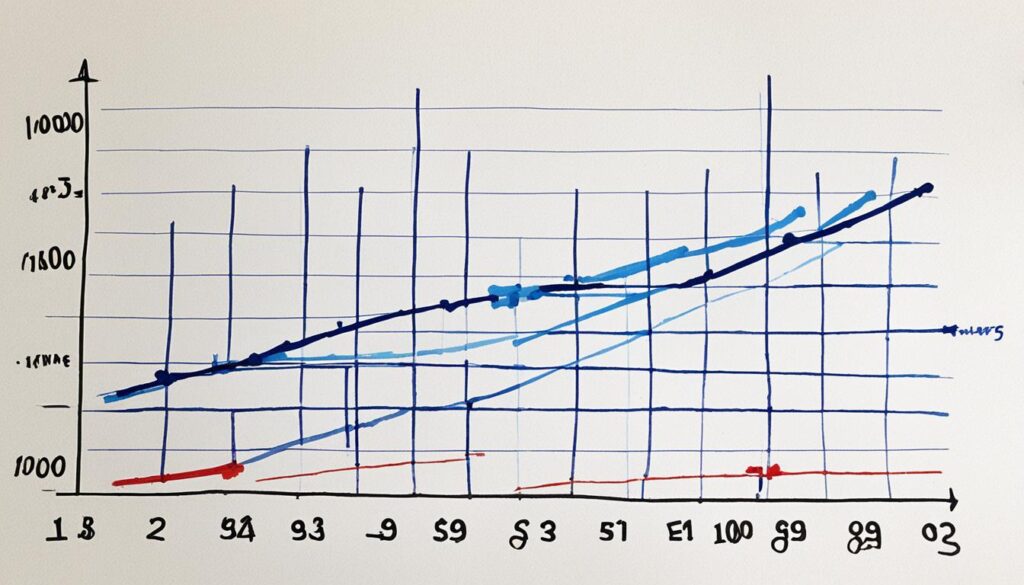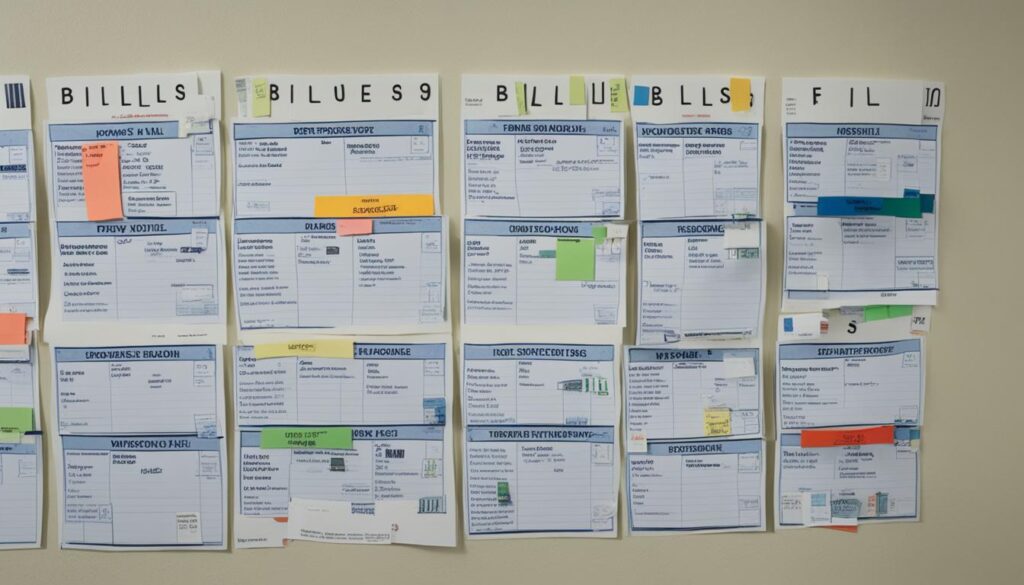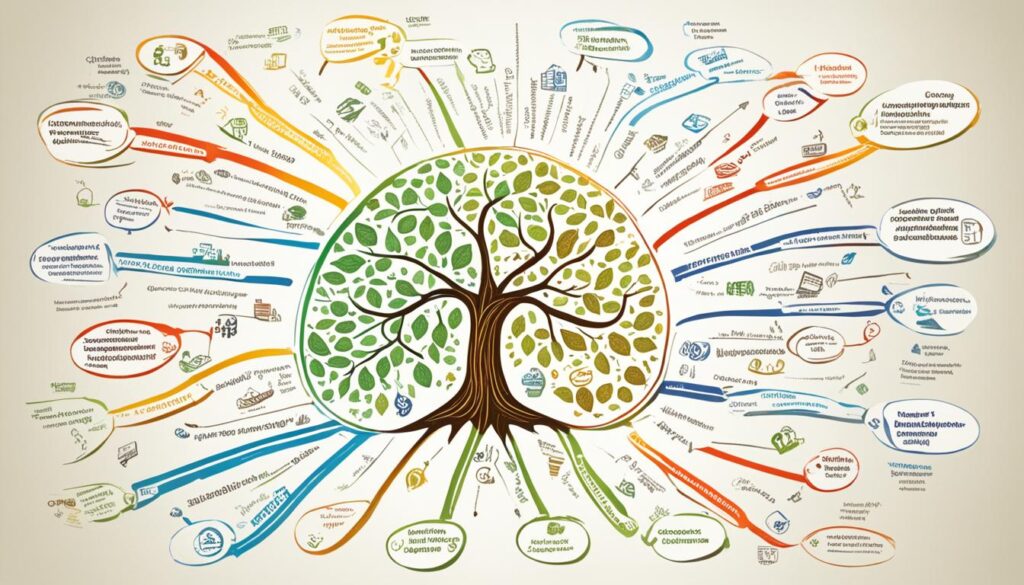Dealing with personal finance gets tough with an uneven income. You might be a freelancer, in a job that pays on commission, or just looking for tips on handling money with a fluctuating income. Having a good budgeting strategy is key. When your income varies, budgeting needs special tactics. With the right tools and knowing how to budget each month, you can find stability and peace of mind.
Being adaptable and planning ahead are crucial for financial security with changing incomes. By mastering irregular income budgeting strategies, you set yourself up for a solid financial future. As we explore budgeting with unpredictable incomes, remember three things. Know your numbers, be ready for surprises, and watch your spending. This advice is great for freelancers or anyone trying to manage money better when income is not steady.

Key Takeaways
- Estimate your base monthly income conservatively, considering past earnings for better financial planning.
- Categorize expenditures into essentials and non-essentials to prioritize your spending effectively.
- Apply zero-based budgeting principles to make every dollar count and align spending with goals.
- Keep track of expenses continuously to adjust your budget promptly and stay agile with your finances.
- Adopt the use of budgeting apps and tools to streamline the budgeting process and enhance your financial management.
- On receipt of higher-than-expected income, reallocate funds strategically to build savings and meet financial objectives.
- Prepare a new budget monthly to accommodate for fluctuations in income and maintain accuracy.
Understanding the Challenges of Irregular Income
Managing finances can be tough. This is especially true for people with challenges of irregular income. They face unpredictability every day. Finding stability in fluctuating income is crucial for them. They must have smart budgeting-for-irregular-income strategies to stay financially healthy.
Common Professions with Variable Paychecks
Some jobs have irregular income. Freelancers work on different projects often. Sales professionals earn through commissions which change a lot. Entrepreneurs and contract workers face ups and downs too. They deal with changing client demands, and seasonal trends.
The Importance of Stability Amidst Fluctuations
People with variable paychecks need to find stability in fluctuating income. Creating a financial safety net is important. Knowing budgeting-for-irregular-income tricks can help meet expenses during tough times. This approach lowers stress and improves financial security. It helps manage money better, even in lean periods.
| Profession | Income Frequency | Common Income Variations |
|---|---|---|
| Freelancers | Project-based | Client demand, project scope |
| Sales Professionals | Commission-based | Market trends, sales cycle |
| Contract Workers | Contract length | Contract renewal, market demand |
| Entrepreneurs | Profit-based | Business growth, economic conditions |
To wrap it up, dealing with challenges of irregular income is key for people with variable paychecks. Using good budgeting-for-irregular-income methods is vital. They bring the needed stability. This makes the journey to financial peace easier.
The Basics of Budgeting-for-Irregular-Income
Managing money can be tough if your income changes often. But, learning how to budget with irregular income is key to financial success. It’s crucial to start with the basics of budgeting-for-irregular-income before moving to more complex topics.
With irregular income, you need a flexible plan. Instead of expecting a set amount, use your past earnings to guess your future income. This helps create a safe starting point for budgeting-for-irregular-income.
First, figure out what expenses are must-haves versus nice-to-haves. Make sure to cover essentials like bills and living costs first. This way, you can navigate through income ups and downs without missing out on necessities.
Here’s a quick guide for sorting your expenses:
| Essential Expenses | Non-Essential Expenses |
|---|---|
| Rent/Mortgage | Dining Out |
| Utilities | Entertainment Subscriptions |
| Groceries | Vacations |
| Transportation | Shopping for Non-Essentials |
| Healthcare | Gadgets and Tech |
Having a structured plan for your money will prepare you to handle income changes smoothly.

This image shows the balance needed in finance management. It’s like walking a tightrope where careful budgeting helps you reach your goals. Budgeting is your balancing pole on this uncertain path.
Learning the basics of irregular income budgeting is the first step towards financial security. It empowers you to maintain financial health, no matter how unpredictable your income is.
Step 1: Estimating Your Base Monthly Income
Starting with budgeting-for-irregular-income means figuring out your base monthly income first. This step is vital for creating a dependable financial plan. But predicting your income can be tricky. Thankfully, your past earnings offer clues for future planning.

Looking at Historical Earnings
Analyzing your historical earnings is crucial for a solid budget. Look back at your income history. Identify patterns and the lowest months. Using these low periods as your budget’s base ensures you’re prepared for tough times.
Setting Conservative Income Projections
With your earning history clear, it’s time to make conservative income projections. This means planning for lean times while hoping for better. By estimating lower income, you protect against sudden drops, staying financially steady through ups and downs.
| Month | Earnings | Notes |
|---|---|---|
| January | $2,000 | Post-holidays slowdown |
| February | $2,500 | Steady client work |
| March | $1,800 | Unexpected expense |
| April | $3,000 | New project launch |
| Average Monthly Earnings | $2,325 | |
Understanding both your historical earnings and conservative projections prepares you for budgeting-for-irregular-income. This first step builds a strong foundation for your budgeting approach. Now, fluctuations in income become manageable, allowing for financial stability in any situation.
Step 2: Categorizing and Prioritizing Expenses
First, we set a base monthly income. Now, we organize our spending. Categorizing expenses helps us tell apart needs from wants when budgeting-for-irregular-income. This is key to being financially strong, ready for any income changes.
Distinguishing Between Essential and Non-Essential Spending
At this stage, we see what spending is a must and what can wait. Essential costs are things like your home and food, which you can’t live without. Non-essentials add to life’s enjoyment and can change based on what you earn each month.
Planning for the Four Walls: Food, Shelter, Utilities, and Transportation
We then focus on four walls budgeting. It highlights basic needs: food, a place to live, utilities, and getting around. Let’s explore these areas to see why they matter and how to prioritize spending.

| Expense Category | Description | Priority Level |
|---|---|---|
| Food | Nourishment is a basic need; this includes grocery shopping but not dining out. | High |
| Shelter | Mortgage or rent payments ensure you have a roof over your head. | High |
| Utilities | Keeps essential services such as water, power, and heat running. | High |
| Transportation | Essential for getting to work or other necessary travel. | High |
Start by setting aside money for these key areas. Once they’re covered, use what’s left for other wants or savings. This smart budgeting-for-irregular-income tactic makes sure you’re ready for anything. It gives you a solid base and flexibility for peace of mind.
Applying Zero-Based Budgeting Principles

Considering budgeting-for-irregular-income? Zero-based budgeting principles could be your answer. Assigning every dollar a purpose maximizes how effective your earnings are. This isn’t just tracking spending—it’s planning where every dollar should go.
From bills and savings to paying off debt, this method helps you live better financially.
What is Zero-Based Budgeting?
Zero-based budgeting is unique in managing money. It starts anew each month. Every earned dollar gets allocated to expenses, savings, or investments. Its tailored for people with irregular income streams.
Assigning Every Dollar a Purpose
Embracing zero-based budgeting means assigning every dollar a purpose. Even with changing income, this paints a clear financial picture. It requires picking what’s important: necessities, savings, or debt repayment.
This approach promotes reviewing spending, cutting waste, and adjusting to income shifts. It aims at maximizing income to secure your finances and ease stress linked to budgeting-for-irregular-income.
Tracking and Adjusting Expenditures Continuously
For budgeting-for-irregular-income, being able to change plans is key. This means tracking expenses well is a main part of managing money wisely. With incomes that change a lot, being able to change how you use your budget helps you stay stable.

To make the most of what you earn, continuous budget monitoring is crucial. Here’s what you need to do to manage your money when your income changes:
- Start by recording every expense right when it happens. This helps you really see what you’re spending and find ways to save.
- Check your spending tracker every week. This lets you quickly make changes to your budget, keeping it up to date with your income.
- A review at the end of each month is crucial. Comparing your planned budget with what you actually spent helps you plan better for the future.
Remember, budgeting-for-irregular-income isn’t just about setting goals. It’s about actively managing your money to make sure it’s used well.
Let’s see a real-life example of how this works:
| Expense Category | Estimated Cost | Actual Spending | Variance | Adjustments for Next Month |
|---|---|---|---|---|
| Groceries | $300 | $250 | -$50 | Allocate $25 to savings, $25 to debt repayment |
| Utilities | $150 | $180 | +$30 | Investigate higher bill; consider energy-saving measures |
| Medical | $100 | $120 | +$20 | Adjust budget to reflect new average cost |
| Rent | $800 | $800 | $0 | Maintain current allocation |
This process helps with budgeting-for-irregular-income and improves decision-making. Even with fluctuating income, a detailed and flexible financial plan keeps your targets achievable and your spending on track.
Identifying Tools for Irregular Income Budgeting
Handling budgeting-for-irregular-income can be tricky without the right tools. Thankfully, we now have many budgeting tools thanks to tech advancements. These tools are designed to match your financial habits and goals. Let’s look at how they help manage a changing income.
Benefits of Using Budgeting Apps
In today’s times, budgeting apps are great for those with changing incomes. These apps have many features that simplify budgeting. They can automatically track spending by linking to your accounts, saving time. This feature is especially useful for those with unpredictable earnings.
Additionally, budgeting apps have forecasting tools. They notify you about future cash shortages. Alerts like these can help you dodge financial troubles. Here’s how different apps stack up:
| App | Manual Tracking | Automated Tracking | Additional Features |
|---|---|---|---|
| You Need A Budget (YNAB) | Yes | Yes | Financial reporting, Goal tracking |
| Mint | Yes | Yes | Bill reminders, Subscription monitoring |
| PocketGuard | No | Yes | Spending limits, ‘In My Pocket’ feature |
| EveryDollar | Yes | Yes (with premium) | Debt tracking, Custom reports |
Selecting the right app can make budgeting-for-irregular-income much easier.

Manual vs Automated Tracking Methods
While budgeting apps offer convenience, some prefer manual tracking. Writing transactions down can help you understand and control spending. If you like hands-on money management, a ledger or notebook works well.
But, automated tracking has its advantages. It saves time and minimizes mistakes. It offers a real-time view of your finances. Think about whether you prefer the control of manual tracking or the ease of automated methods.
The key to budgeting-for-irregular-income is consistent tracking. Regularly updating your budget with your chosen budgeting tools can lead to financial stability. This is true no matter how much your income changes.
Step 5: Budget Adjustment on Pay Days
Pay days are a mix of relief and challenges when you don’t have a steady income. You need a smart strategy for each time money comes in. It’s key to adjust your budget on pay days to make sure you’re moving towards your goals.

Deciding what to do with extra money is as important as getting through tough times. Should you cover current needs or save for the future? Making the right choices on pay days helps you reach your financial goals faster.
Dealing with Income Surpluses
It’s tempting to spend extra cash on fun things. But smart people see it as a chance to strengthen their finances. Use extra money wisely by paying off debts, saving, or investing, depending on your big financial goals.
Reallocating Funds to Financial Goals
Pay days are a good time to check your budget and think about your goals. You might add to your emergency fund, pay extra on your mortgage, or invest for retirement. These steps lead to a stronger financial future and peace of mind.
| Surplus Scenario | Financial Goal | Action Step |
|---|---|---|
| Extra Freelance Project | Debt Repayment | Allocate 50% towards credit card debt |
| Bonus Commission | Emergency Fund | Top up emergency fund to target level |
| Seasonal High Earnings | Investment | Contribute to IRA or stock portfolio |
Being flexible with your budget is crucial for managing irregular income. Every pay day is a chance to adjust your budget. If you manage extra money well and focus on your goals, you’re not just getting by. You’re on your way to financial success.
Preparing a New Budget Each Month
Budgeting with an irregular income means you have to be adaptable. Each month brings new financial challenges. It’s crucial to make a fresh budget every month. You should examine your expected money in and out. This helps adjust your budget to match what really happens with your income.

To stay on top of your finances, plan every month. You need to understand how to manage your money well. It’s also important to know where your money should go. Here, we explain how to plan for various expenses when your income changes:
| Expense Category | Description | Notes |
|---|---|---|
| Housing | Rent or mortgage payments | Adjust for any change in utility bills or maintenance costs |
| Food | Groceries and dining out | Meal planning can help regulate this variable expense |
| Transportation | Vehicle payments, fuel, public transit | Consider fluctuations in travel needs |
| Utilities | Electricity, water, internet, and other services | Seasonal changes may affect these costs |
| Savings & Investments | Emergency fund contributions, retirement accounts | Adjust based on current income levels |
| Healthcare | Medical bills, insurance | May vary depending on health circumstances |
| Debt Repayment | Credit cards, loans | Extra income could be allocated here to reduce debt faster |
| Entertainment | Movies, events, subscriptions | Discretionary area that can be adjusted based on surplus |
Reviewing your spending areas each month is key. It helps you make a budget that is realistic and flexible. This method makes dealing with budgeting-for-irregular-income easier. It also helps you stay ready for unexpected changes.
“Embrace the flexibility that comes with irregular income. It’s a chance to get better at managing your money.” – A seasoned financial coach on irregular income budgeting techniques.
In summary, being able to change, knowing your expenses well, and regularly checking your budget are vital. These steps help you manage your money well, no matter what. They ensure you keep heading towards financial success every month.
Building Your Emergency Fund for Financial Security
Setting up an emergency fund is key when budgeting with irregular income. It ensures financial security and offers a safety net against income variability. By saving for unexpected events, you dodge the stress of sudden costs.

An emergency fund is more than just extra money. It gives you breathing space during financial surprises. Having this fund means you don’t have to rely on credit, which helps avoid debt.
Understanding the Size and Purpose of an Emergency Fund
An emergency fund should match your life and financial needs. It’s not just about saving money. It’s about covering your living costs for three to six months. This makes your emergency fund a customized financial cushion that fits your expenses and income variability.
Emergency Fund as a Buffer Against Income Variability
With a fluctuating income, an emergency fund smooths out the rough patches. It helps keep your finances steady despite income changes. This fund helps you manage without messing up your budget or long-term goals.
| Expense Categories | Suggested Emergency Fund Allocation | Notes |
|---|---|---|
| Housing & Utilities | 40-45% | Crucial for maintaining shelter stability |
| Food | 10-15% | Baseline amount to cover nutrition needs |
| Healthcare | 10% | Includes insurance and out-of-pocket costs |
| Transportation | 10-15% | Essential for work and daily activities |
| Debt Payments | 5-10% | Minimum payments to keep debts in good standing |
| Miscellaneous | 5% | For unforeseen, miscellaneous expenses |
In conclusion, an emergency fund is crucial for financial security when dealing with budgeting-for-irregular-income. By focusing on this financial buffer, you lessen the impact of income variability on your life.
Maintaining and Reviewing Your Budget Regularly
Budgeting-for-irregular-income is key for staying financially strong. Just like a navigator uses a compass, checking and adjusting your budget helps you stay on track. It is important to keep an eye on your finances all the time.

Staying Disciplined in Budgeting Habits
Creating good budgeting habits is like getting into shape. It requires dedication and hard work. By keeping track of every dollar, you get to know exactly how you spend. This detailed approach builds a strong financial base, even with an unpredictable income.
Learning and Adapting from Month-to-Month Variations
Every month brings a new financial scenario. Profits may change, and unexpected events can impact your budget. The crucial move is to stay flexible and adapt to income changes. Doing regular budget checks allows you to learn, adjust, and improve. A financial journal might help capture these insights.
| Month | Incomes Generated | Total Expenses | Surplus/Deficit |
|---|---|---|---|
| January | $4,500 | $3,200 | $1,300 |
| February | $3,000 | $3,500 | -$500 |
| March | $5,250 | $4,000 | $1,250 |
This table shows the ups and downs of budgeting. It stresses how crucial it is to adjust to changing incomes. By regularly checking and updating your budget, you can handle the unpredictable. This keeps you moving towards your financial goals.
The Role of Banking and Savings Accounts in Managing Irregular Income
People with budgeting-for-irregular-income find modern banking vital. It offers tools for handling money that goes up and down. A basic checking account, without interest, is key. It holds your cash, letting you make smooth transactions. This is crucial for planning without the worry of changing interest rates.
Having a strong emergency fund is at the heart of good finances. Savings accounts play a big role in this. They keep your money safe for surprises and help achieve big money goals. Choosing the right savings account means you’re thinking ahead. It helps manage the ups and downs of banking for irregular income. This way, you’re ready for anything, expected or not.
Using the right savings accounts shows you’re good with money. Especially when your income changes a lot, this can make you strong financially. For freelancers, business owners, and those earning through commissions, these accounts do more than hold money. They guide towards financial solidity and growth. Strategic banking is essential for those learning budgeting-for-irregular-income. It’s not just helpful; it’s necessary.